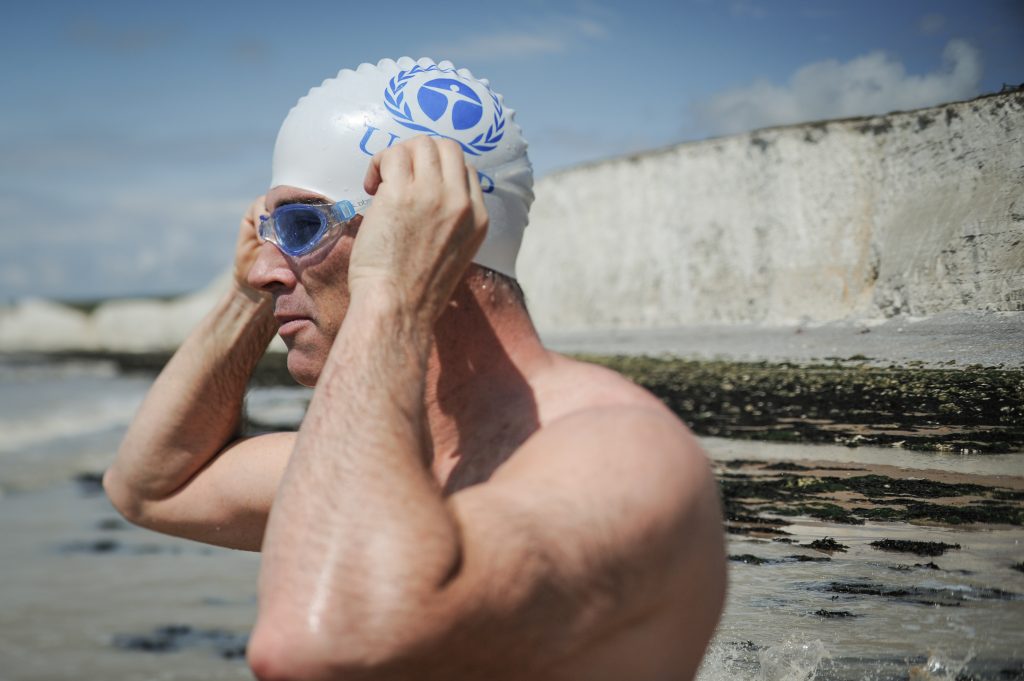
31st August 2018
UN Patron of the Oceans and endurance swimmer, Lewis Pugh, has become the first person to swim the full length of the English Channel, from Land’s End in Cornwall all the way along England’s south coast to Dover.
The 330 mile (530km) swim took Pugh just 49 days to complete, and was done in line with the Channel Swimming Association’s guidelines, wearing just a Speedo, cap and goggles. An exhausted Pugh arrived on Shakespeare Beach in Dover shortly after 1.30pm on the 29th August, to welcoming crowds who’d stood out in the rain to welcome him after his pioneering achievement. He made sure to touch the harbour wall before getting out, which signalled the end of his swim.
Pugh battled countless jellyfish stings (which are becoming more prevalent because of warming seas as a result of climate change), a shoulder injury and one of the busiest shipping lanes in the world on his epic feat.
Writing in a blog for Sky News, Pugh said, “I just got more and more tired as the swim progressed. The cumulative toll of kilometres of strokes, combined with an injury and lack of sleep, really put a strain on the whole thing.”
Pugh completed the swim as part of a global campaign to protect 30% of our oceans by 2030. Pugh wrote on his website that he was undertaking the swim to call on the British government, along with all other governments to strengthen ocean protection. According to Pugh, “The sad truth is that of the 750,000 square kilometres of seas around the UK, only 7 square kilometres are fully protected.”
Pugh is also hoping that his swim will help address the severe plastic pollution crisis, which has gripped our oceans. Pugh writes, “I’ve seen plastic in the Arctic, in the Antarctic, and everywhere in between. I’ve seen it floating far out at sea and deep underwater. It’s everywhere. There is now no place in the oceans without plastic pollution. And it is having a devastating effect on marine wildlife.”
He goes on to note that we each have a role to play in reducing usage of plastics, by considering the purchases we make, “If every one of us took this message into our hearts and into our homes and stopped using single use plastic, we could stop plastic pollution at source.”
Plastic pollution is becoming a growing concern across the world, and pressure is being piled on governments to take action. Documentaries like Blue Planet, which showed the impact of plastic pollution on ocean wildlife, combined with research that suggests that there could be more plastic than fish in the oceans by 2050, has spurred a push for global action.
For Lewis Pugh, the hard work isn’t over. In his Sky News blog, he says, “Despite my deep fatigue, my real work begins now. I need to drive our message home to the Foreign Office, to DEFRA, to DFID, to the Department of Education — so many different departments need to work together to protect our oceans. The task is not small. We need to restore something that has been plundered for 300 years.”
After the ordeal Lewis Pugh has been through, let’s hope that leaders take his message to heart and act now, while we still can.
My new cli-fi children’s picture book is Nanook and the Melting Arctic. Nanook is a caring polar bear who lives in the Arctic. But when his igloo starts melting, Nanook must find a way to save his friends and his home. He knows that the people who can help are also those who’ve caused the problem and he must find a way to convince leaders to act on the climate crisis. You can purchase Nanook from Amazon’s global stores including Amazon UK and Amazon US.